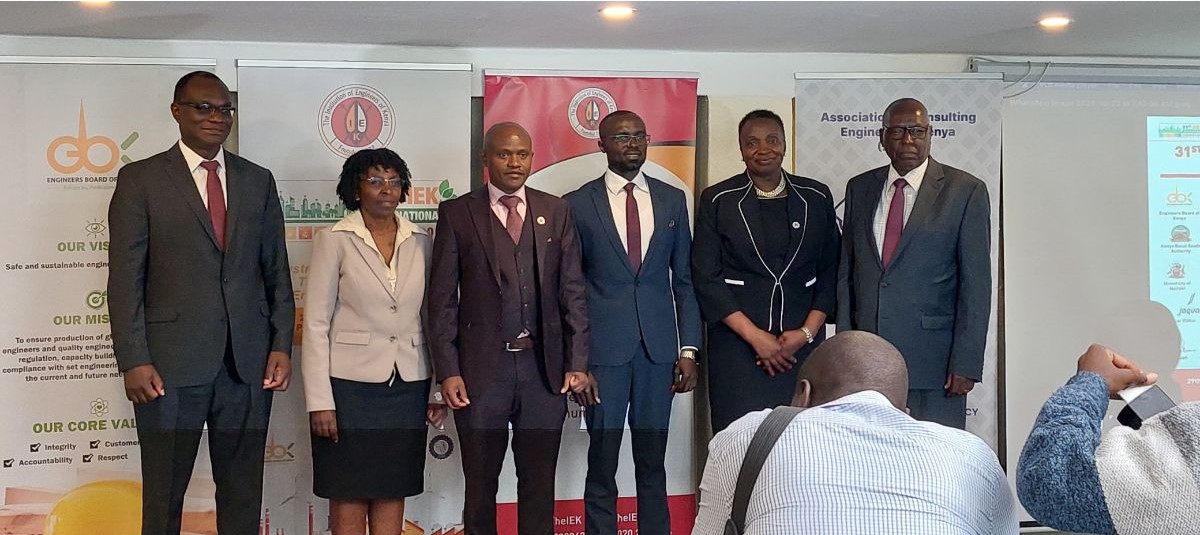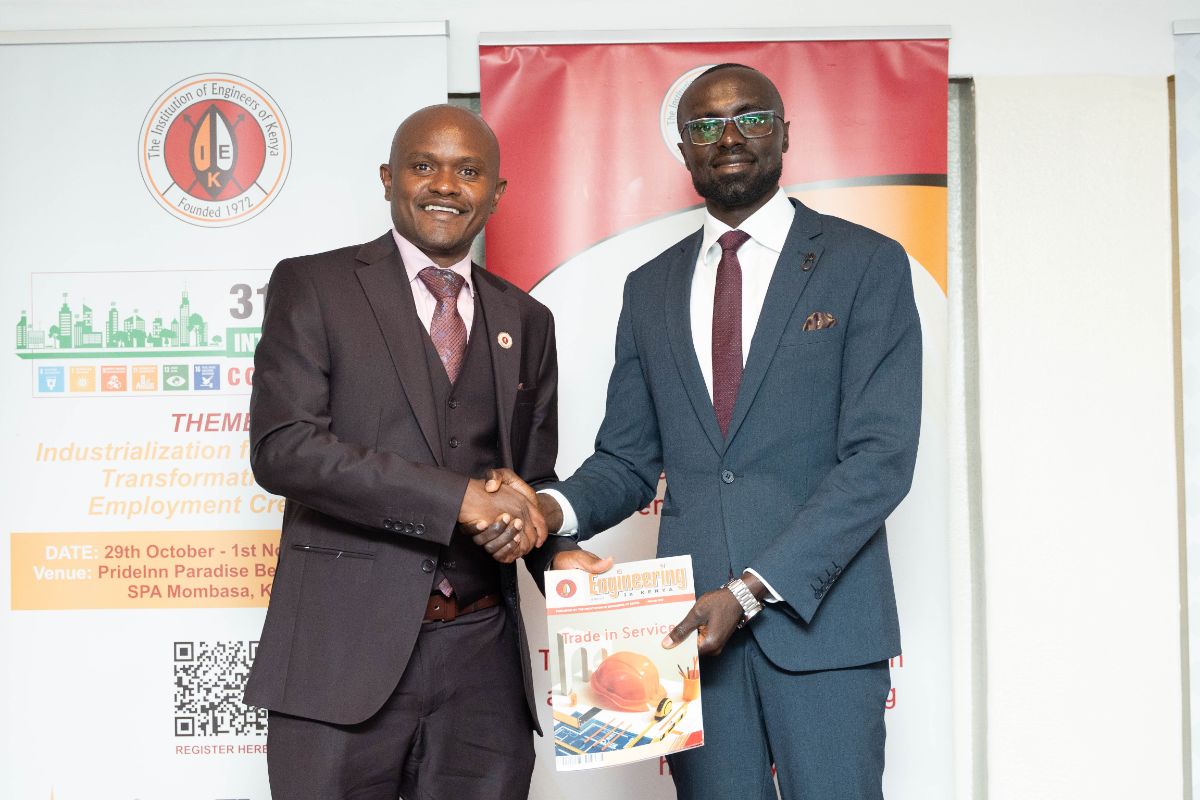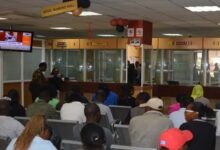Industrialisation, Job Creation, Investment Talks to Dominate IEK Convention

Conversations around industrial growth, job creation, investments in the manufacturing sector and economic transformation are expected to take centre stage during the 31st Institution of Engineers of Kenya (IEK) International Convention.
The convention, which is scheduled for October 29 to November 1, will be held in Mombasa and is expected to host over 3000 delegates physically and online.
This year’s event is themed: Industrialisation for Economic Transformation and Employment Creation.
The convention is expected to bring together leading engineers, policymakers, and industry leaders from Kenya and beyond to explore how industrialization can fuel Kenya’s economic growth, generate employment, and position the nation at the forefront of Africa’s industrial landscape.
Speaking during a media launch, Ministry of Water, Sanitation and Irrigation CS Eric Mugaa said the convention speaks to the need for innovation and technology development to propel Kenya Kwanza’s Bottom Up Economic Transformation Agenda.
He further noted that in today’s fast-changing world, research and development across all sectors is crucial to keeping our country competitive, highlighting that engineers play a pivotal role in ensuring that the integration of innovative tech becomes a necessity.
“Engineers are not only at the forefront of innovation across multiple sectors but also play a pivotal role in driving economic transformation,” he said.
“They are uniquely positioned to find innovative solutions and to drive industrialisation and enhance productivity across different sectors as they work tirelessly to deliver projects on a daily basis.”
CS Mugaa added that one of the government’s key objectives is to build capacity in all public projects which is vital for industrialisation efforts adding that it believes in the immense potential of local engineers and that it is essential to prioritise their talents.
“To support this growth, we must ensure we have a strong regulation framework and a safe policy that is in place. This will enable engineers to thrive, innovate and deliver on their mandate to build a better Kenya,” Mugaa continued.
“We must invest in the next generation by providing them with training, mentorship and hands-on experience on a daily basis. We can equip them with skills they need to address the challenges of tomorrow.”
He further said that a diverse and inclusive workforce is not just a moral imperative but a business imperative in the modern world.
“By promoting gender equality, we bring more ideas, creativity and innovation which is part of this year’s theme on driving industrialisation,” Mugaa said.
On investments, CS Mugaa noted that the ministry is in the state of receiving privately initiated proposals for projects.
“We need to engage private capital and the only way is to attract investors through the Public Private Partnerships (PPP) whereby they invest in the projects, run them for a while and then hand them over to us,” he said.
“These Projects will have our local engineers whereby they will gain skills from the private developers and utilise them for our future development.”

On his part, Institution of Engineers of Kenya (IEK) President Shammah Kiteme highlighted that a couple of challenges are affecting the manufacturing sector adding that the concerns were raised with the Ministry of Trade and Investments which is a show that engineers are keen in leading such conversations.
The challenges include an uncertain and unpredictable policy landscape which continues to stifle the manufacturing industry, as well as costs and needs of doing business which remain prohibitive.
Others include loss of competitiveness compared to other countries, and heavy taxation of imported raw materials which is a big inconvenience.
“The results have been massive job cuts, increase in local consumer prices, reduction in tax revenue, total collapse of exported products in some areas and reverse trade from other countries as well as relocation of some industries,” Kiteme said.
He further noted that if the country addressed such challenges and also witnessed rapid industrialisation, we would also witness creation of employment opportunities and growth in our economy.
“We believe that industrialisation is actually achievable and this is because in 2015 the contribution of manufacturing to GDP was 10%. Sadly, as of last year, it had dipped to 7.6%. However, we know that our goal is that by 2030, the contribution will be at 20%,” he said.
“We have strong faith that this is achievable.”
The convention will entail keynote speeches, panel discussions, paper presentations, poster presentations and exhibitions by partners.
Kiteme highlighted that pending bills is also a key problem that the government must help resolve because many firms have sent engineers home and have not paid them for months.
He also said that the sector has increasingly witnessed opportunities for engineers being set aside for foreigners adding that the voice of engineers is that this needs to be addressed seriously.
“In the road sector alone, there are approximately Sh 200 billion in pending bills. This is a menace. We also have members going for even 12 months unpaid,” Kiteme added.
“To succeed we need to take care of the welfare of engineers. We have to ensure local content requirements are met even as we embrace the PPP arrangements. We must not sideline Kenyan engineers.”
The media launch also featured insights from Engineers Board of Kenya (EBK) Chairman Erastus Mwongera, who highlighted Kenya’s strides in aligning its engineering standards with global best practices through the Washington Accord.
This international agreement among bodies responsible for accrediting engineering degree programs ensures that Kenyan engineers are recognized globally.
He also reaffirmed EBK’s commitment to safety and capacity building through initiatives such as the Graduate Engineers Internship Program (GEIP), which has successfully transitioned over 700 graduate engineers into professional practice.
“We recently completed a mock assessment of the university programmes that will be assessed for this journey and we hope next month when we do the proper assessment, it will meet the success,” Mwongera said.
“Thereafter, next year we shall submit the application and by June we expect that Kenya will be admitted as a signatory and be given a signatory status.”
Mwongera also affirmed the board’s commitment to ensuring that Kenya’s industrialisation journey is driven by skilled, ethical and well-regulated professions.
“Together, we will make this convention a success and more importantly drive forward the industrial transformation that will create a brighter future for Kenya and the region in offering jobs in the engineering industry,” he said.
Follow us on Telegram, Twitter, and Facebook, or subscribe to our weekly newsletter to ensure you don’t miss out on any future updates. Send tips to editorial@techtrendsmedia.co.ke



